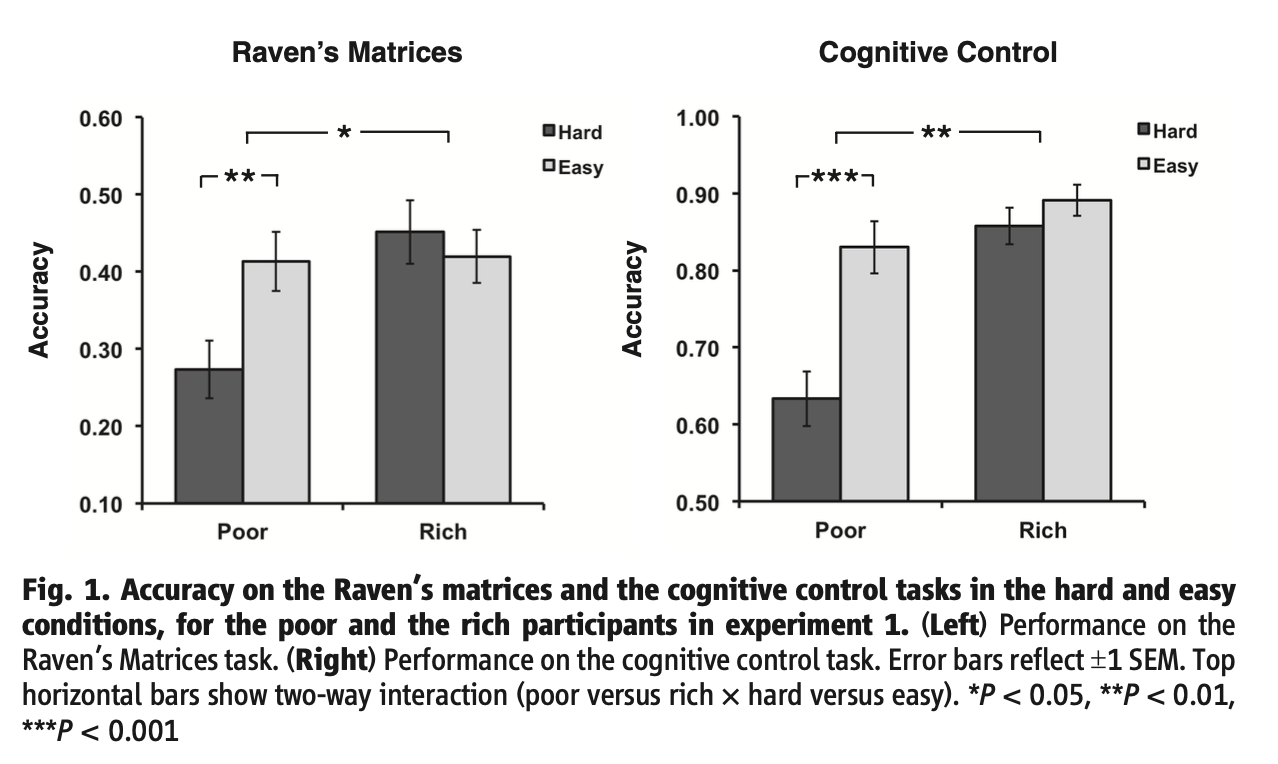New scarcity scenarios!
For my MS thesis, I want to explore how poverty may affect learning and memory by exploring alternative means of inducing stress in both teens and adults. Inspired by Drs. Eldar Shafir and Sendhil Mullainathan book, I wanted to adapt the experimental design from their original study done in 2013 and modify them to a reward learning paradigm and for an adolescent population.
In their original experiment, Mani et al. (2013) asked New Jersey mall shoppers to review 4 hypothetical financial scenarios prior to engaging in a cognitive task. An example of a hard and easy (value in parenthesis) scenario is provided below:
The economy is going through difficult times; suppose your employer needs to make substantial budget cuts. Imagine a scenario in which you receive a 15% (5%) cut in your salary. Given your situation, would you be able to maintain roughly your same lifestyle under those new circumstances? If not, what changes would you need to make? Would it impact your leisure, housing, or travel plans?
After thinking through 4 similar financial scenarios and completing the task, the experimenters wanted to observe how performance would have differed based on the difficulty of the scenario (a hard financial situation versus an “easier” one) and how this differ based on income. Below is one of the figures reported, which highlights that accuracy was only affected in low-income participants if they were exposed to financially difficult questions.

Figure 1 adapted from Mani et al. (2013)
While the 4 scenarios from this paper would be terrific additions for my thesis project, they are not exactly applicable to a younger age group. For example, the above scenario is only applicable to demographics with jobs and them relying on their employment to meet basic needs. Thus, students in high school to think about how a 15% pay cut would affect them may not induce the same level of stress as it might if I asked their parents 1.
That is why, for the first part of my thesis project, I’ve designed some age-appropriate scarcity scenarios! The following table includes the initial draft of my scenarios:
| Drafts | Description (easy version in parenthesis) |
|---|---|
| Scenario #1 | This summer, your school has decided that all students must enroll in a summer program in order to graduate, and the total cost of the program is $1,500 ($150). Can you afford this? |
| Scenario #2 | Your parents sent you to the dentist and you find out you need an important operation for your teeth. Your total bill ends up being $2,000 ($200). Can you pay for this? What can you do? |
| Scenario #3 | You find out that your house has a terrible bug infestation and you are unable to stay in your home for at least a week. Not only does your family need to pay $500 ($50) for them to clean the place, but you need to also make accommodations to stay somewhere else. Your family can either; Stay with someone else. Do you have enough space for everyone in your family? Are you able to do so quickly on such short-notice?; or Stay in temporary housing. You can stay at a motel that costs $100 ($10) a day for the week. |
| Scenario #4 | It’s time for you to go to college and you’ve accepted an offer for a school that is out-of-state. Unfortunately, your school was going to pay but they inform you that due to some errors they cannot pay for it but they can reimburse you but you must make the purchase. Classes start in a few days and you are suppose to fly off in 2 days. A one-way ticket to the university costs $600 ($60). Are you able to afford this? |
All of these are currently in their draft stage, and prior to incorporating them into a behavioral task, I will be distributing them for some initial data on how stress-inducing they are by age and family income level. The hope is that this will provide some support that they have a similar impact as the original scenarios did in the 2013 paper. And, if this works, these could be useful to explore in a reward learning task and maybe with some neuroimaging designs (which, to the best of my knowledge, has not been done as much? 2).
Leave a comment